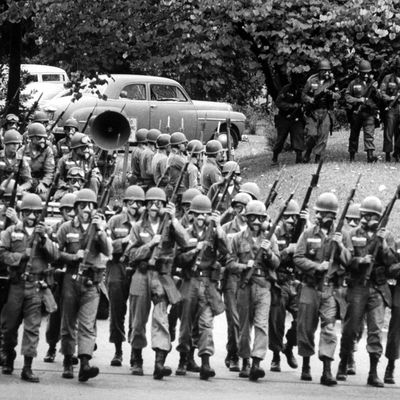
During the last few days, President Trump has bobbed and weaved in his reaction to the killing of George Floyd and the unrest that act unleashed. But as police-protester conflicts escalated and spread, he has grown more and more truculent, and more and more dismissive of the state and local officials (especially Democrats) trying to manage a difficult situation in the middle of a pandemic and an economic collapse.
Late last week he attacked Minneapolis’s “radical left” Mayor Jacob Frey, and threatened to “send in the National Guard and get the job done right.” That was a bit puzzling, since Governor Tim Walz had already called out and deployed the Guard, but most observers focused on Trump’s nasty invocation of the old racist riot-control slogan, “When the looting starts, the shooting starts,” which he unconvincingly tried to walk back later.
On Monday morning, Trump held a call with governors after a weekend of violent clashes. In comments one participant called “unhinged,” he ranted at his fellow chief executives for failing to act more repressively toward law-breaking protesters and opportunistic looters. At around the same time, Arkansas senator Tom Cotton, who once responded to calls for criminal-justice reform by stating that America had an “under-incarceration problem,” started encouraging Trump to take over the clampdown and send in the military:
And before you knew it, Trump tweeted his agreement:
Cognoscenti of presidential legal authority recognized Cotton’s tweet as a call for invocation of the Insurrection Act, which is the only way a president can send U.S. military units (as opposed to the National Guard, which can be deployed by governors or, with restrictions, by the president) into an active law-enforcement role. As the name suggests, it’s intended for rare emergency situations in which POTUS is willing to declare that there’s a rebellion underway that threatens a complete breakdown in authority. Its most famous recent usages were by Dwight D. Eisenhower and John F. Kennedy, who deployed troops to the Deep South to enforce desegregation court orders, recognizing that state and local officials in the region were entirely unwilling to do so themselves.
Less famously, Lyndon Johnson called in federal troops to help police in Washington, D.C., control riots following the assassination of Martin Luther King Jr. in 1968, though federal supervision of the District of Columbia meant no state or local authorities were bypassed. And most recently, George H.W. Bush sent military units into Los Angeles, where large and dangerous protests broke out following the acquittal of police officers who beat Rodney King — but he did so only at the request of California governor Pete Wilson.
If Trump orders widespread military deployments against the wishes of state and local officials to deal with civil unrest, it would be unprecedented — that is, unless you think of blue America as a renegade region like the Jim Crow South. But it’s clearly under consideration, as today’s White House press briefing indicated:
White House press secretary Kayleigh McEnany told reporters in Washington around the same time as Trump’s tweet that the Insurrection Act is “one of the tools” at his disposal, adding, “Whether the president decides to pursue that, that’s his prerogative.”
Perhaps it’s a bluff, and just a signal to the MAGA folk that Trump is the toughest dude in town. But it’s hard to imagine anything more divisive at this moment of national insecurity than the spectacle of U.S. military units invading our cities with the kind of bloodthirsty instructions Tom Cotton clearly relishes.






























